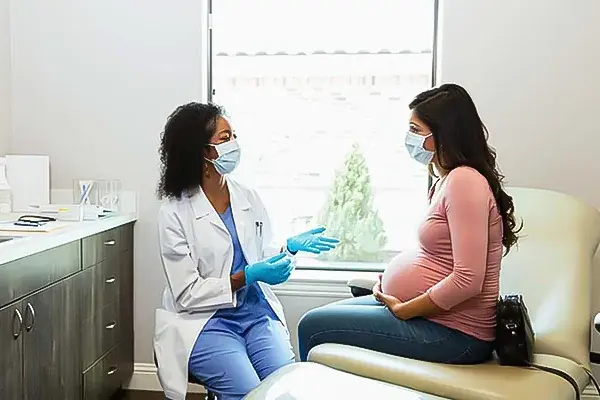What is High-Risk Pregnancy Care?
High-risk pregnancy care involves specialized medical attention for pregnancies that have a higher chance of complications affecting the mother, baby, or both. These complications can arise due to pre-existing medical conditions, pregnancy-related issues, or unexpected problems during pregnancy. High-risk pregnancy care aims to monitor and manage these risks to ensure the best possible outcomes for both mother and baby.

Factors Contributing to High-Risk Pregnancy
1. Pre-Existing Medical Conditions
Certain medical conditions can increase the risk of complications during pregnancy. These include diabetes, hypertension, heart disease, autoimmune disorders, kidney disease, and obesity. Women with these conditions require close monitoring and specialized care to manage their health and the health of their baby.

2. Pregnancy-Related Issues
Pregnancy itself can sometimes lead to complications, such as gestational diabetes, preeclampsia, multiple pregnancies (twins or more), and placenta previa. These conditions require careful monitoring and management to prevent serious health issues for both mother and baby.

3. Maternal Age
Maternal age plays a significant role in pregnancy risk. Women over the age of 35 are more likely to experience complications such as chromosomal abnormalities, miscarriage, and preterm birth. High-risk pregnancy care for older mothers involves additional screenings and monitoring.

4. Previous Pregnancy Complications
Women who have experienced complications in previous pregnancies, such as preterm labor, stillbirth, or recurrent miscarriage, are considered high-risk. They need tailored care to address and mitigate the risks in their current pregnancy.

The High-Risk Pregnancy Care Process: Step-by-Step
1. Initial Assessment and Risk Identification
During the initial assessment, the healthcare provider reviews the mother’s medical history, conducts physical examinations, and performs necessary tests to identify any factors that could make the pregnancy high-risk. This assessment helps in creating a personalized care plan.

2. Regular Monitoring and Check-Ups
Regular monitoring and frequent check-ups are crucial in managing a high-risk pregnancy. These visits may include blood pressure checks, blood tests, ultrasound scans, and fetal monitoring to track the baby’s growth and development.

3. Specialized Testing and Screenings
High-risk pregnancies often require specialized tests and screenings, such as amniocentesis, chorionic villus sampling (CVS), and non-invasive prenatal testing (NIPT). These tests help detect genetic disorders, fetal abnormalities, and other potential issues early on.

4. Medication and Treatment Plans
Depending on the identified risks, the healthcare provider may prescribe medications or recommend specific treatments to manage conditions like gestational diabetes, hypertension, or preterm labor. Adhering to these treatment plans is vital for the health of both mother and baby.

5. Delivery Planning and Preparation
For high-risk pregnancies, planning the delivery is crucial. The healthcare provider discusses the safest delivery options, which may include a planned Cesarean section (C-section) or induction of labor. The goal is to ensure a safe delivery for both mother and baby.

Benefits of High-Risk Pregnancy Care

- Improved Outcomes: Reduces the risk of complications for both mother and baby by providing specialized care and monitoring.
- Early Detection: Identifies potential issues early, allowing for timely interventions.
- Personalized Care: Tailors care plans to the specific needs of each patient, ensuring comprehensive management of risks.
- Enhanced Support: Provides emotional and psychological support to expectant mothers, helping them navigate the challenges of a high-risk pregnancy.
How Dr. Ravina Bhesania Can Help
Dr. Ravina Bhesania is a renowned obstetrician in Surat, India, specializing in high-risk pregnancy care. With her extensive experience and compassionate approach, Dr. Bhesania offers personalized care plans tailored to each patient’s unique needs. She provides comprehensive monitoring, advanced diagnostic testing, and effective management strategies to ensure the best possible outcomes for both mother and baby. Dr. Bhesania’s dedication to her patients’ well-being makes her a trusted choice for high-risk pregnancy care in Surat.
FAQs
Conclusion
High-risk pregnancy care is essential for ensuring the health and safety of both mother and baby in pregnancies with increased risks. With the expertise of specialists like Dr. Ravina Bhesania in Surat, India, expectant mothers can receive comprehensive and personalized care tailored to their specific needs. If you are facing a high-risk pregnancy, contact Dr. Ravina Bhesania for a consultation and explore your options for specialized care.
Contact Dr. Ravina Bhesania for a consultation and personalized high-risk pregnancy care today.
